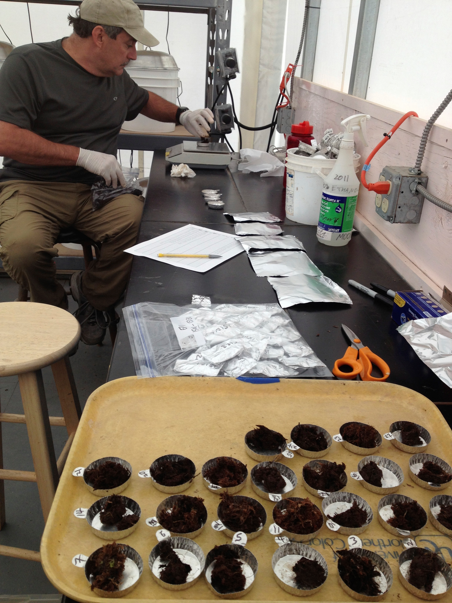 K-12 Schoolyard Program
K-12 Schoolyard Program  Our Schoolyard LTER program focuses on Barrow, Alaska the nearest large town to Toolik Lake. We foster a strong link with this local community because of its historic involvement with science and its interest in, feeling of ownership of and responsibility for North Slope science. Activities at Barrow over the past 20 years have included:
Our Schoolyard LTER program focuses on Barrow, Alaska the nearest large town to Toolik Lake. We foster a strong link with this local community because of its historic involvement with science and its interest in, feeling of ownership of and responsibility for North Slope science. Activities at Barrow over the past 20 years have included:
- Weekly lectures by researchers on a wide range of scientific topics.
- A K-12 science inquiry-based program that replicates some of our experimental and monitoring activities in tundra and lakes
- Until 2014, each year 1-4 LTER personnel visit Barrow to lecture in the “Saturday Schoolyard” and in the public schools. However, our partner in this program, the Barrow Arctic Science Consortium (BASC), recently dissolved and closed. Efforts are underway to collaborate with the Utgeavik Inupiat Corporation and the Barrow Native Heritage Center to reestablish this program, now in collaboration with the Environmental Literacy Program at Colorado State University.
- In summer 2015 a graduate student and REU working with the ARC LTER participated as instructors in summer “Schoolyard” science programs in the villages of Kaktovik and Arctic Village, Alaska, organized by USGS and USFWS.
 Polar Hands-On Laboratory The Polar Hands-on Laboratory is offered each year by the Logan Science Journalism Program of the Marine Biological Laboratory (MBL). Each summer, following a two-week intensive exposure to biology at the MBL, 2-12 science journalists travel to Toolik Lake for hands-on experience in the Arctic. Our aim is to infuse public-communication professionals with excitement for arctic research and with the principles of doing science. The program is a tremendous impact multiplier with the graduates serving as ambassadors of our research to the general public and to others who are unable to visit our remote site. Polar Hands-On Laboratory The Polar Hands-on Laboratory is offered each year by the Logan Science Journalism Program of the Marine Biological Laboratory (MBL). Each summer, following a two-week intensive exposure to biology at the MBL, 2-12 science journalists travel to Toolik Lake for hands-on experience in the Arctic. Our aim is to infuse public-communication professionals with excitement for arctic research and with the principles of doing science. The program is a tremendous impact multiplier with the graduates serving as ambassadors of our research to the general public and to others who are unable to visit our remote site. |
  Research Experience for Teachers (RET) Research Experience for Teachers (RET)K-12 Teachers visit Toolik Lake to participate in summer field and lab research. The goal of the program is to provide teachers with experience in scientific research that will inform their teaching and will provide them with access to data, methods, and other materials that they can use in their classrooms. In cooperation with the Environmental Literacy Program at Colorado State University, each summer we host 2-10 K-12 teachers. Funding for RETS comes from a variety of sources, including ARCUS, PolarTREC, NSF, and the ARC LTER Schoolyard Program. |
|
Graduate and Undergraduate Courses |
Research Experiences for Undergraduates (REU) and Graduates Each year the LTER supports a minimum of 2 REU students at the Toolik Field Station, and 2-10 others in association with collaborating NSF grants. REU’s have their own independent research projects, mentored by a PI. Graduate students from all over the world supported on collaborating grants make use of our long-term experiments and data sets. To promote communication among Toolik researchers and students, a weekly seminar series called "Toolik Talking Shop” is given throughout the summer months. REU students present their results at these sessions and at an end-of-summer poster session. Graduate students (and occasionally REUstudents) are invited to our annual winter workshop in Woods Hole to present their results and to participate in planning for the following summer's research. Each year the LTER supports a minimum of 2 REU students at the Toolik Field Station, and 2-10 others in association with collaborating NSF grants. REU’s have their own independent research projects, mentored by a PI. Graduate students from all over the world supported on collaborating grants make use of our long-term experiments and data sets. To promote communication among Toolik researchers and students, a weekly seminar series called "Toolik Talking Shop” is given throughout the summer months. REU students present their results at these sessions and at an end-of-summer poster session. Graduate students (and occasionally REUstudents) are invited to our annual winter workshop in Woods Hole to present their results and to participate in planning for the following summer's research. |

 Courses in Arctic Ecology for graduate and undergraduate students
Courses in Arctic Ecology for graduate and undergraduate students